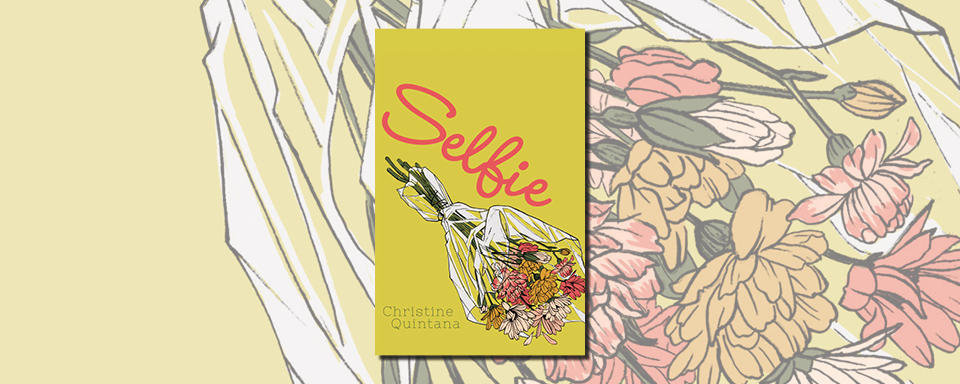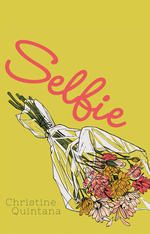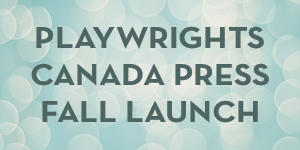
See them, name them, learn from them
An interview with Christine Quintana on Selfie
If you were to drunkenly hook up with someone at a party, do you consider that giving consent? What about if you had liked this person for years? What if he’s a good guy and would never do something like that? What if you don’t remember a thing, but have proof that the thing you knew you didn’t want to do happened? What if nobody believes you? These are a lot of very real questions for the teens in Christine Quintana’s new play Selfie. Sixteen-year-old Emma realizes she doesn’t remember what happened between her and her crush, Chris, at his sister Lily’s party. When a doctor’s appointment and visit from police confirm there was a sexual assault, the school turns against Emma. Even Lily, her best friend, doesn’t understand why this doesn’t feel right. Selfie smartly opens up a much-needed conversation about the complexities of relationships and the nature of consent.
We spoke to Christine about the back stories of Selfie, why conversations about consent are so important, and how teens have received the play.
Selfie started as a commission—what drew you to the story?
Around the time that Théâtre la Seizième approached me about a TYA commission, the terrible sexual assault cases in Steubenville and Maryville were making international news. I heard two conversations going on—one about how awful the United States is, and another more private one about experiences and stories here at home that look an awful lot like what we like to think happens “somewhere else.” I wanted to create a story that was a container to look at our complicity as a culture, how a lack of language and practice around consent permeates our interactions, and how we shy away from the truly difficult discussions about sexual assault when they occur close to us.
You started writing Selfie years before #MeToo—how have you seen the discussions about consent change through your development of the play, and has that affected any updates to the text?
I get asked this a lot, and I feel like my answer has shifted the more it gets asked. In the end, I always feel a bit sad when Selfie is characterized as prescient or relevant, because it’s actually just a new(ish) arrival to a very old conversation. There’s something about describing things as pre- or post-#MeToo that make me feel tired in a way I’m sure pales in comparison to what activists doing work against sexual violence for decades must experience. I feel like this play came out just before the—and please note my quotation marks here—“wave of #MeToo plays.” In programming, in seeing shows, I keep getting this fatigued vibe from the community—“Yes, we get it, we get it.” As if we ever “got it.” Yes, this movement pulled the stopper off a bottomless bottle of trauma narratives that deserve and need their day in the sun. But alongside that is the terrible effect of powerful movements being watered down by overuse—hearing phrases like “Oh yeah, so and so got MeToo’d” makes me want to climb under a rock. It feels like we’ve somewhat redistributed fear without actually eradicating it. But all this to say, if anything, I feel like the threat of cancel culture—for both characters implicated in the story—has become more visceral, as we see the effects of social media power in both its ability to deliver and pervert justice in real and tangible ways. I hope this play highlights how what happens online and in the public sphere is so very, very far away from what needs to happen in our immediate and personal relationships.
What kinds of reactions to the text have you heard from teens? What’s stuck out to you? Were there any differences between younger and older age groups?
The full-length English language show at Young People’s Theatre was an absolute ride. I got to attend quite a few performances and sit amongst students and hear them editorialize and respond to the story, and that was a real gift for me. Feeling them invest so deeply in Emma and Chris’s romance, and then watch the fallout was very powerful. Two things really stuck with me from that run from the talkbacks—one was a young student who openly challenged a teacher who had expressed the desire for their students to come forward to them with anything—this student said, “That’s not true—you only care about the students who do well, who you are invested in.” The layers in that—that class, race, perceived “goodness” play into who might be perceived as worthy of advocacy—was profound. Another unforgettable moment—when after a deep debate about what happens to Chris at the end of the play, a young student stood up and said, “Everyone tells us we need to use consent, but no one actually tells us what that means.”
To some, it may not seem clear right away what the problem is—what would you encourage teens and adults alike to look for in the text—and in real life—in order to understand?
This is what is exciting and scary for me about this play being in print and in general circulation—some might read this piece as a call to arms against rape culture, others might see it as a cautionary tale about demonizing young men who have done nothing wrong. Because we don’t like nuance. Nuance doesn’t make decoding the world easier. Applying a moralistic lens to our flawed human lives is, however, a recipe for reductive and binary thinking. So I would encourage readers to return to the assertion that consent is a human right—we have the right to decide who touches us, who takes pictures of us, what we eat and drink, who we have sex with. But our daily interactions have pulled us so far away from that, to the point that we not only sometimes fail to see and name not only the big broaches of consent, but the million small ones along the way. See them, name them, learn from them.
Besides the relationship between Emma and Chris, it’s important to take a look at the dynamic between Emma and Lily and how Lily reacts to Emma’s news. Can you speak a bit on what it was like to write their relationship?
Oh my god yes. I feel like female friendships are criminally underrepresented in media, when I think they’re some of the most powerful and transformational relationships out there. Particularly at that age when you’re planting the seeds for the adult person you’re about to become, when you’re coming into your power and intellect, and when you’re starting to learn more tangibly about the violence that the world has in store for you. You’re learning to choose competition or solidarity. And you talk all day, all night, and all the time. I specifically created the dynamic between the three characters to look at what Lily is asked to hold—her conflict holds the key, I think, to the question I’m trying to pose to readers. Can you hold two truths, in their entirety, at once? To be honest, Lily is my favourite character I’ve ever written; I think she’s a genius and so easily underestimated, like so many women I know. She’s so often pitched as the villain of this piece, when in fact she’s actually just the audience cypher. What would you do, if the two people you would die for are in a terrible situation?
Can you recommend any other essential reading—books or articles—that you think readers may be interested in?
Absolutely. As I try to cultivate some gratitude during this curséd plågue (I feel like jaunty accents take the sting off it all), I am thankful for the time to read more. Some adjacent writing that I’ve found incredibly impactful—Hunger by Roxane Gay, In the Dream House by Carmen Maria Machado, Recollections of My Nonexistence by Rebecca Solnit, and Reproduction by Ian Williams. All have a different lens on the critical question of consent and bodily sovereignty in a culture that constantly tries to strip us of it.
What are you working on now?
In March I’ll pour one out for the postponed Tarragon Theatre premiere of El Terremoto, which is sort of a riff on the twentieth century family drama, set in East Van in a household of Mexican-Canadian women and the people that love them. I’m also workshopping Clean, a bilingual two-hander about women, resilience, and intersectional solidarity (Neworld Theatre and Aluna Theatre are both supporting me with this one). And I’m scratching away at a commission for the Arts Club Theatre, which will be a romantic comedy. I could use a laugh these days—maybe you could too.
Want to read more? Get a copy of Selfie now!



Comments